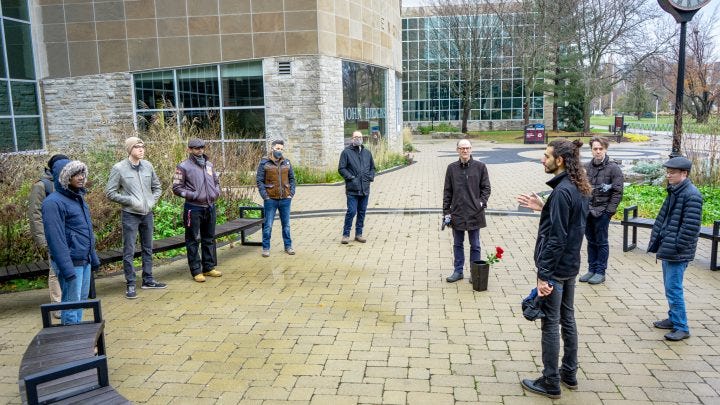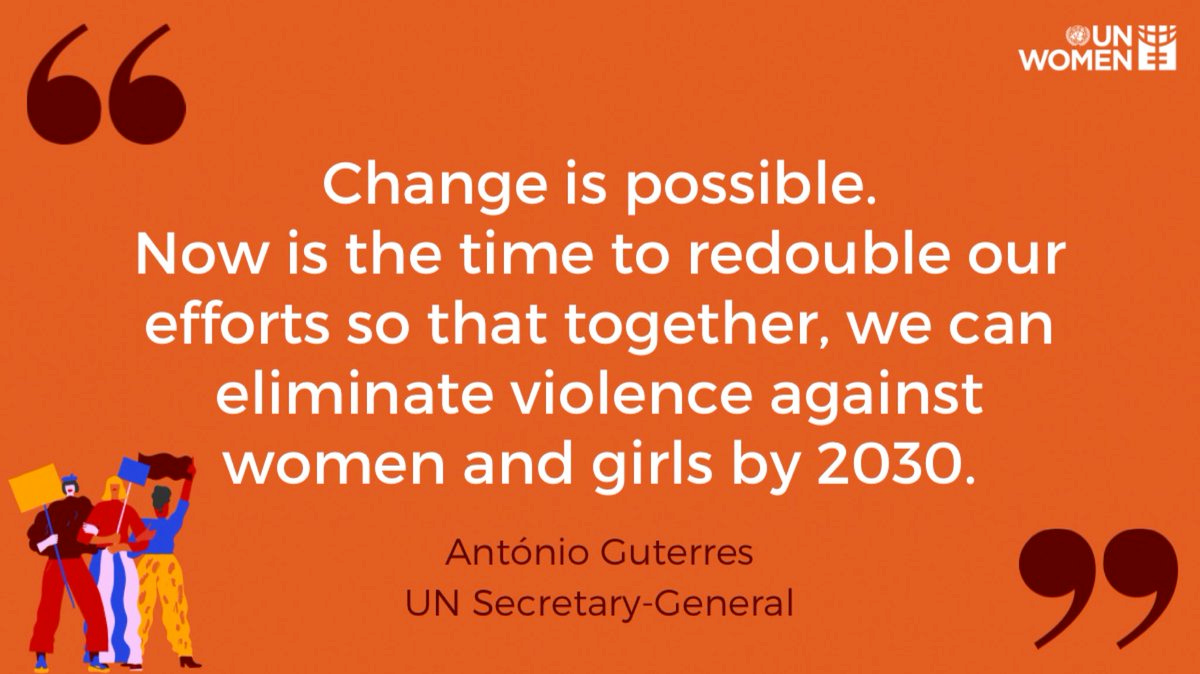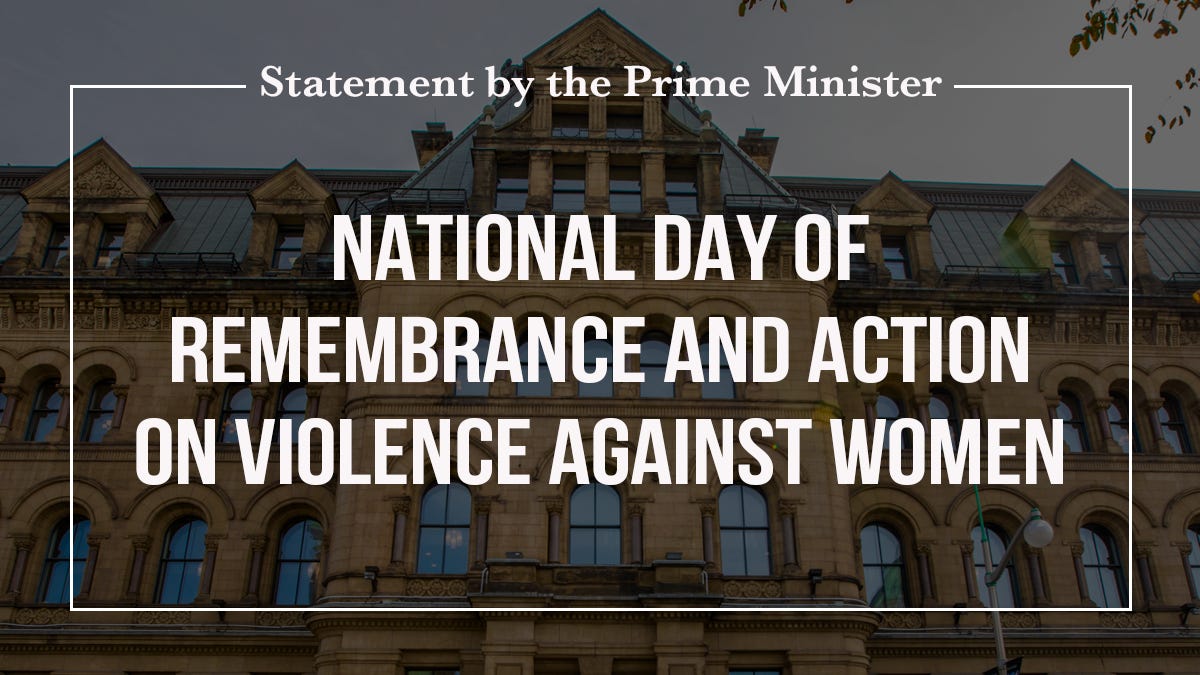Stop Blaming Men for Violence They Didn’t Commit
Here Comes December 6th, Canada’s national day of male shaming
A website at McMaster University in Hamilton, Ontario recently announced its annual Dec. 6 “Day of Remembrance and Action on Violence against Women,” including a Men’s Walk:
Organized by volunteers across campus, including the Dec. 6 committee and the Equity and Inclusion Office, this event is an opportunity for self-identifying men on campus to reflect on their unique role in working to end gender-based violence.
This tour includes a walk around campus to five memorial sites. At each stop along the walk, one man takes a rose, places it at the memorial site, and shares a few words. It is a time to reflect on allyship and on the women and trans folks they have learned from in this work. Each stop is ended with a moment of silence.
Note that the men will reflect on “their unique role” in working to end gender-based violence, which is essentially any form of violence except that against heterosexual men.
The directive might provoke questions in some, including but not limited to the following:
What if the men participating in this walk haven’t learned anything about allyship from women and trans folk?
What if they have learned from past December 6th events that men are the preferred targets of accusation, blame, and hatred, not allyship?
What if the men are rightly tired of being told they must take responsibility for acts of violence they have never committed and which they are powerless to stop?
What if they are mystified by the claim that they have a “unique role” in ending violence? Aren’t they supposed to value women’s “equal” abilities? Do men have other “unique roles,” or only this one?
What if these men have themselves been the victims of violence, a violence that—because it happened to them as men—falls outside the scope of December 6th memorials and is almost never mentioned as a concern in their societies?
What if these men have in fact been victimized by women? What if they have been terrorized and psychologically or physically abused by a vicious spouse or girlfriend? What if they were the battered and/or neglected sons of violent mothers?
If these men want to achieve momentary absolution for their alleged privilege, they must enact the feminist script, castigating masculinity, thanking women and trans, and devoting themselves to protecting women.
Below is a condensed version of a much-longer essay (in video form) on how December 6th memorials have been appropriated by feminist ideologues to shame men.
***
On December 6, 1989, Marc Lépine shot to death 14 women at the Engineering School of the University of Montreal in Canada. He then blew his own head off, leaving behind a suicide note in which he blamed feminism for mass hypocrisy and excoriated feminists for “always trying to misrepresent [men] every time they can.”
More than three decades later, the anniversary of the shootings has become an ironic enactment of Lépine’s complaints, with every man addressed as a stand-in for the gunman. Universities across Canada commemorate the day with memorial gatherings and speeches about “violent misogyny” and “toxic masculinity.”
It has never mattered to authorities and feminist leaders that the shooter, Marc Lépine (born Gamil Gharbi), failed to fit the feminist paradigm of the entitled macho man. Beaten by his mentally ill father, who disappeared from his life when he was seven, raised mainly apart from his mother, taunted by his sister, bullied by his peers, he was a lonely, socially awkward boy who abandoned or failed out of two post-secondary programs and was rejected by the Engineering School at the University of Montreal.
When his mother finally granted an interview in 2008, she seemed more interested in exonerating herself than understanding the impact of her son’s childhood abuse, protesting that “it was not in my home that he was trained to be macho, he must have learned that in school, or from the guys around him, or maybe it’s a genetic thing, I don’t know.”
While it is true that some men abuse and kill women every year in Canadian society, it is also true that women abuse and kill men every year—a fact that entirely undermines the “gender-based violence” explanation insisted upon by feminists. If women are killed by men because men have power in society and are socialized to harm, as feminists claim, how do we explain the men who are killed by women? (In 1991, for example, two years after Lépine’s act, according to Statistics Canada, 87 women were killed by their spouses, as compared to 25 men. Two years later, it was 64 women compared with 24 men. When it comes to non-lethal domestic violence, women participate in hitting, punching, and kicking intimate partners at least as often as men do, and for the same reasons that some men abuse.)
Overall, men are far more likely than women to be homicide victims. In 2018, 484 men, as compared to 163 women, were murdered in Canada. Moreover, men kill themselves far more often than they kill women. These figures are worth pondering not to minimize the horror of what happened at L’Ecole Polytechnique—or any act of violence against women—but to provide context about the capacity of both sexes to cause harm, and the shocking silence in our society about male victims.
When Canadian Prime Minister Justin Trudeau declared on Dec. 6, 2020 that “The safety of women must be the foundation of any society,” it was impossible not to notice the deliberate omission. It’s a national tragedy when women are killed; men’s lack of safety, including their staggering occupational injuries and deaths, is a normal backdrop of every society that no national leader publicly mourns.
Men’s only approved role in relation to the Montreal Massacre has remained constant: to accept their shameful affiliation with Lépine and work unceasingly for women’s advancement. Fourth-year civil engineering student Will Patterson spoke at the University of British Columbia’s memorial service in 2013 to emphasize men’s obligation to stop “consenting to the oppression of women” and “take ownership of the shift to an equal and violence-free culture.” Any man who did not see himself as complicit in women’s oppression had to swallow the thought.
A University of Regina student, Tyler Perkins, part of an initiative called Man Up Against Violence (which hosted a Masculinity Confession Booth two years later), spoke at his school’s annual vigil in 2015 with a similar message, saying “We want men to start taking a stand against gender violence.” He proposed, rather incredibly, that men needed to learn that “Women aren’t lesser than men. They don’t deserve to be objectified and they certainly don’t deserve to be shot in their classrooms.” This man’s challenge to other men was, “It’s not manly to be violent, so why are we acting like it is?”
It couldn’t get much more insultingly simplistic, yet understandably few men feel able to object to the platitudes, or their self-contradictoriness. Men are to advocate for gender equality, but not equality for men. They are to stop being violent, but they are to stop violent men. Years earlier, harsh criticism had been leveled at the men who had left those Montreal classrooms, allowing Lépine to target female students. One young man, Sarto Blais, killed himself within eight months of the massacre, unable to accept the horror and his complicity. Was his masculinity “toxic,” or was it feminist-approved?
Male deaths, men’s pain, and men’s self-understandings are granted no part in the Montreal Massacre story, which promotes a vision of the social and carceral taming of men as part of the state-mandated empowerment of women. It doesn’t seem to matter that the empowerment of women and the hectoring of men about “equality” (while legislation repeatedly institutes female privilege) were precisely what enraged Lépine, according to his suicide note, and are highly unlikely to prevent future Lépines.
The story of the Montreal Massacre is a microcosm of feminist warping of reality for ideological ends. Lépine did not kill because he was socialized into machismo by a woman-hating culture or because he thought he was entitled to control women. There is ample evidence that men’s violence, like women’s, is caused by factors that include mental illness, addictions, stress, and family of origin abuse.
Although it is impossible to know Lépine’s mind, we can plausibly speculate that if he thought about his masculinity, it was to note that Canadian society had little use for unsuccessful men, and was indifferent to, or even contemptuous of, men’s troubles. Like many young men, Lépine sought meaning and identity in traditionally masculine spheres—first the military, then sciences, computing, and Engineering—only to fail, and in the midst of his failure to be told he must embrace the promotion of women even at the expense of his own opportunities. Then as now, he would have been well aware that any public criticism of women or of feminism was impermissible, while mass denunciations of men were perfectly acceptable.
The Montreal Massacre anniversaries are a state-sanctioned occasion not primarily for remembering the women killed but for vengeful anti-male posturing. For men looking on, the message has been clear for decades. No matter how many men die in Canada and around the world, whether through suicide or violence or in loving self-sacrifice, there will never be a day sanctioned to honour them. Even November 11th war memorials, as Lépine indicated, have been “equalized.” While men’s historical and contemporary sacrifices for their society are taken for granted, the bad behavior of some few men is magnified out of proportion and made all men’s responsibility.
It’s far from clear that we can ever “end violence against women,” though the utopian premise conveniently justifies increasingly radical anti-male initiatives. But if we are serious about reducing violence, we should start by acknowledging that male victimization is equally tragic, and we should seek to understand, rather than demonize, those abject figures like Lépine whose “toxic masculinity” we love to hate.






There seems to be some confusion here. We are advised that, at this event, men will have "time to reflect on allyship and on the women and trans folks they have learned from". Wait on - trans men are men, right? Should not trans men, sharing as they must the innate masculine gender-evil, be doing the rose-laying and obeisance with the rest of us? I must insist that trans men are indeed men, and so they too must be admitted to the "unique role in working to end gender-based violence".
Or could it be that this mispositioning of "trans folk" is another tell, another Freudian slip - giving away that (whisper it) in the minds of the Correct, trans men are not really men at all. That, in fact, the whole towering edifice of bullshit that is the trans fashion is just a means of moving up the oppression rankings, that preposterous confection of moronic deceit that fools no one of sense and everyone in positions of power.
Thank you, Janice.
This really means a lot to me.
Some days are really tough and it's people like you that make me feel better.
Your empathy is a soothing salve to me.
I feel like my body has been on the defense, chronically, for a long time.
People like you make me feel like I don't have to keep my defenses up - because I don't feel like I'm being attacked.
You're a good person, Janice.
May the Wind Be at Your Back.
- Edmond Dantes